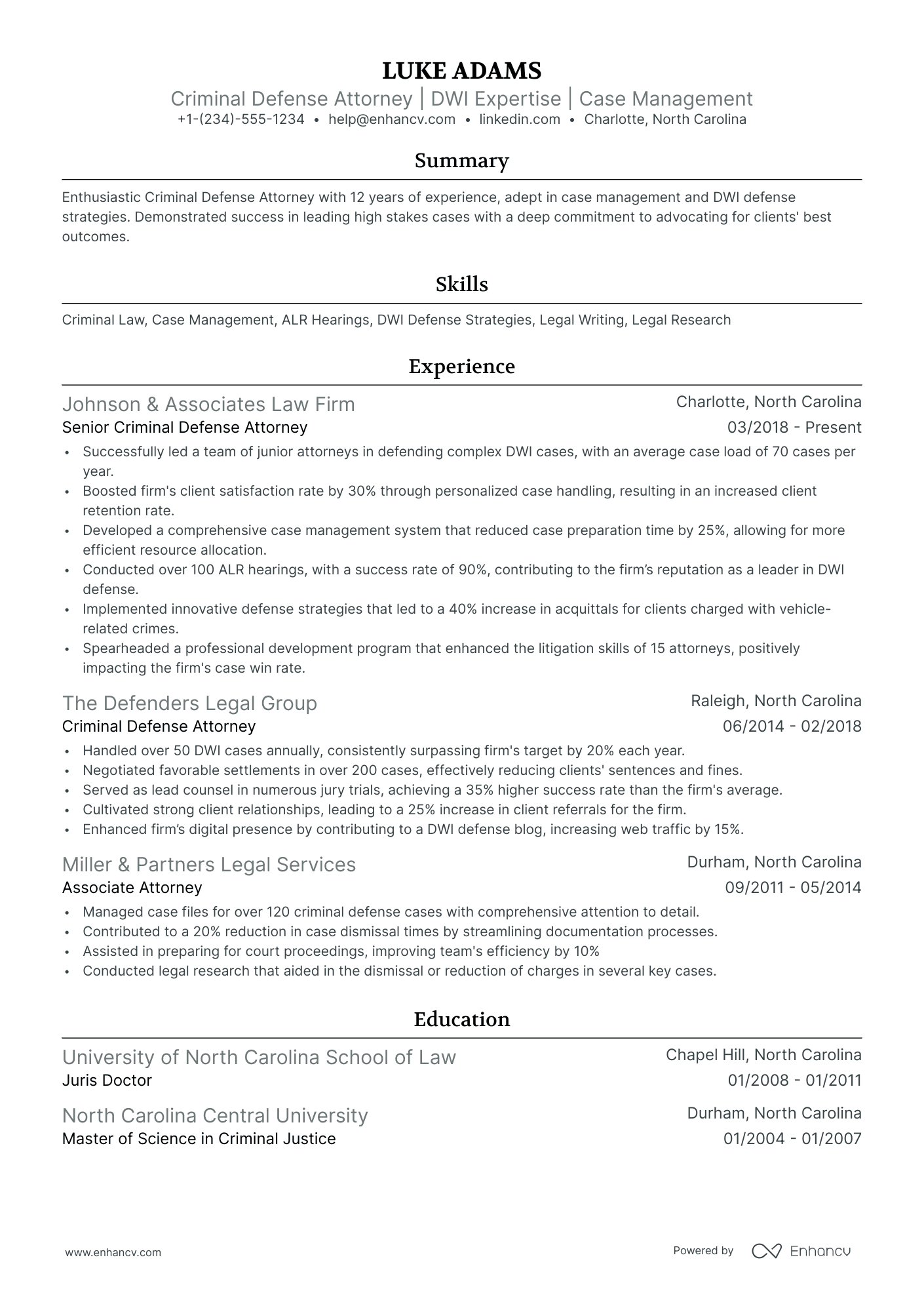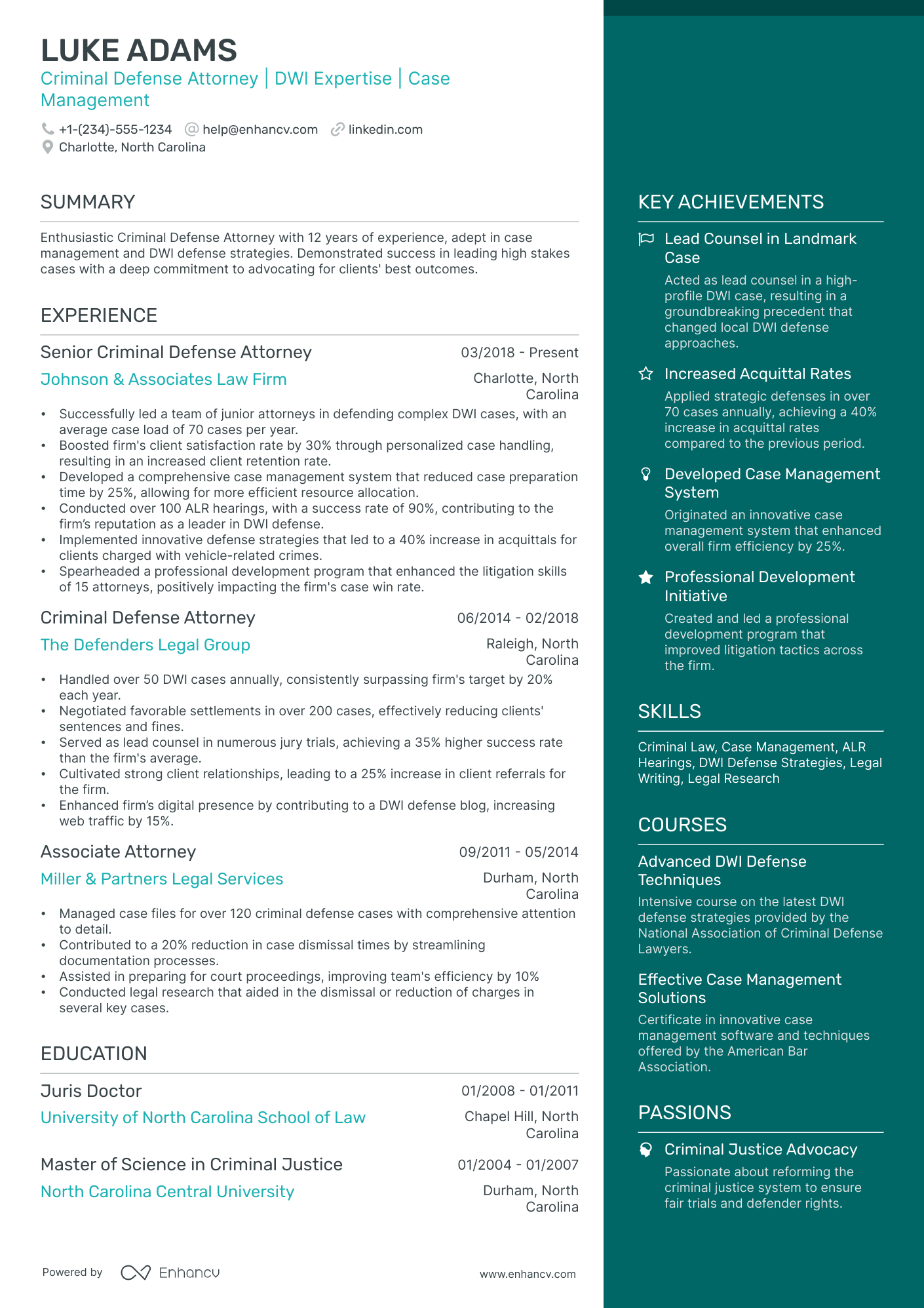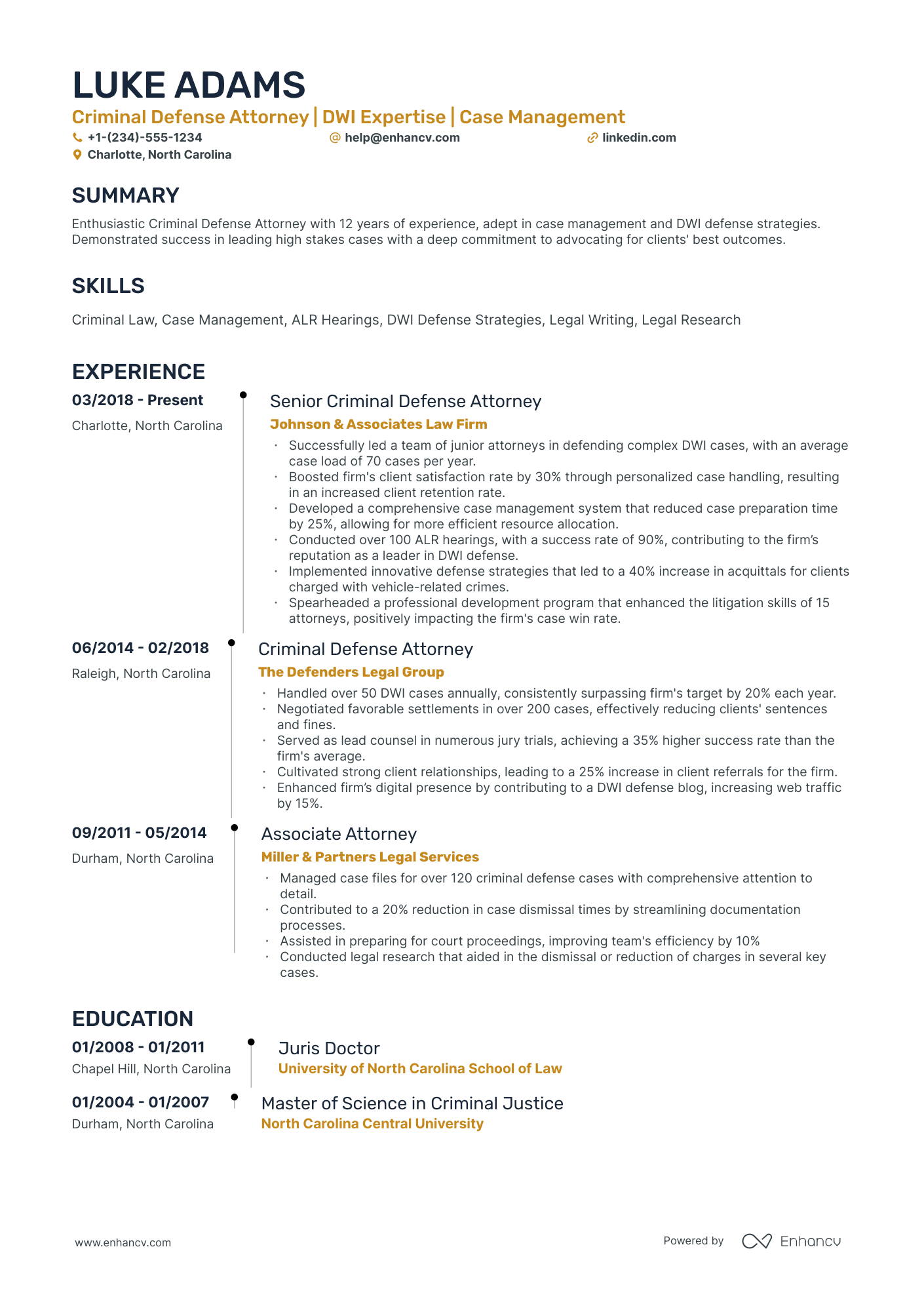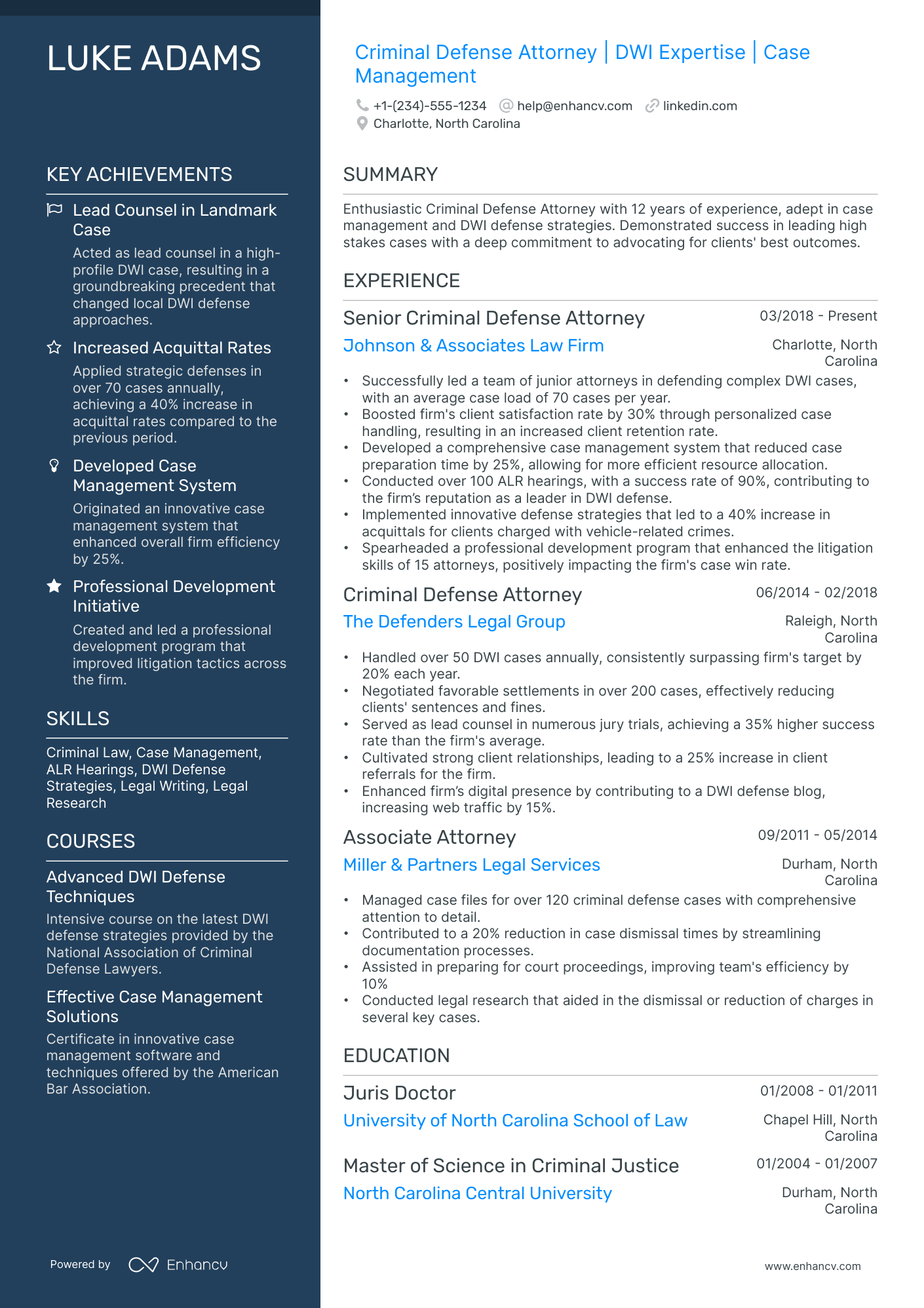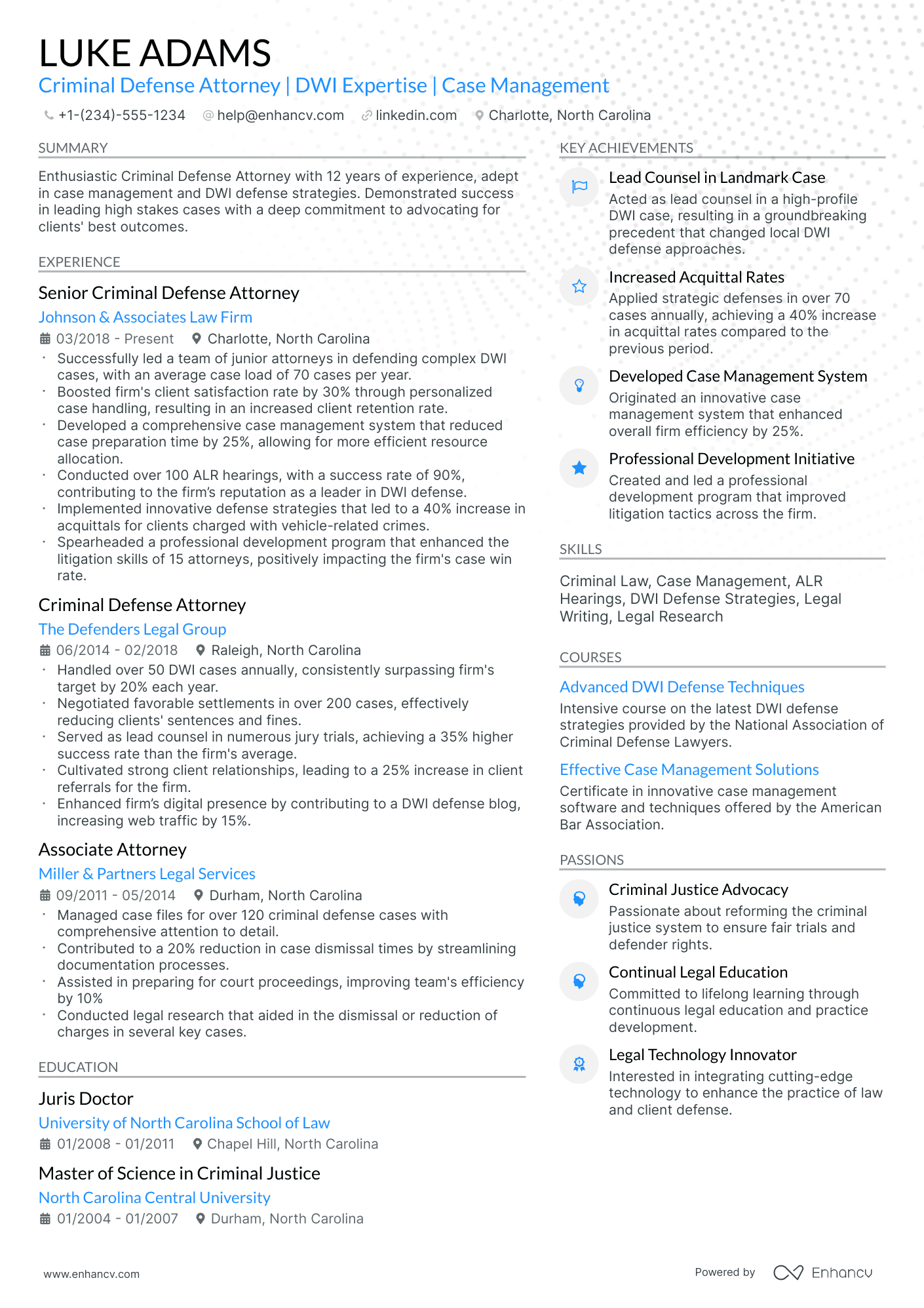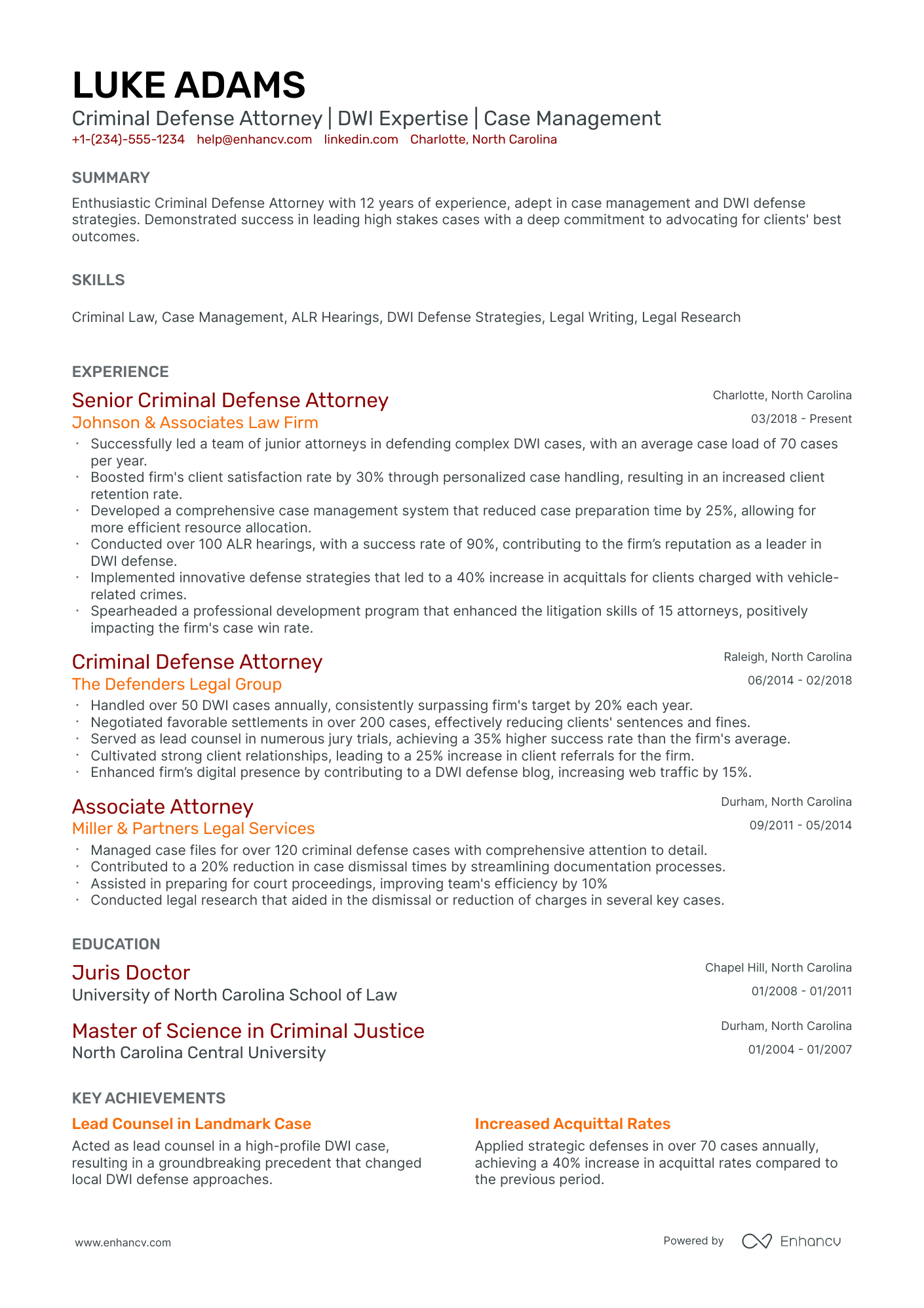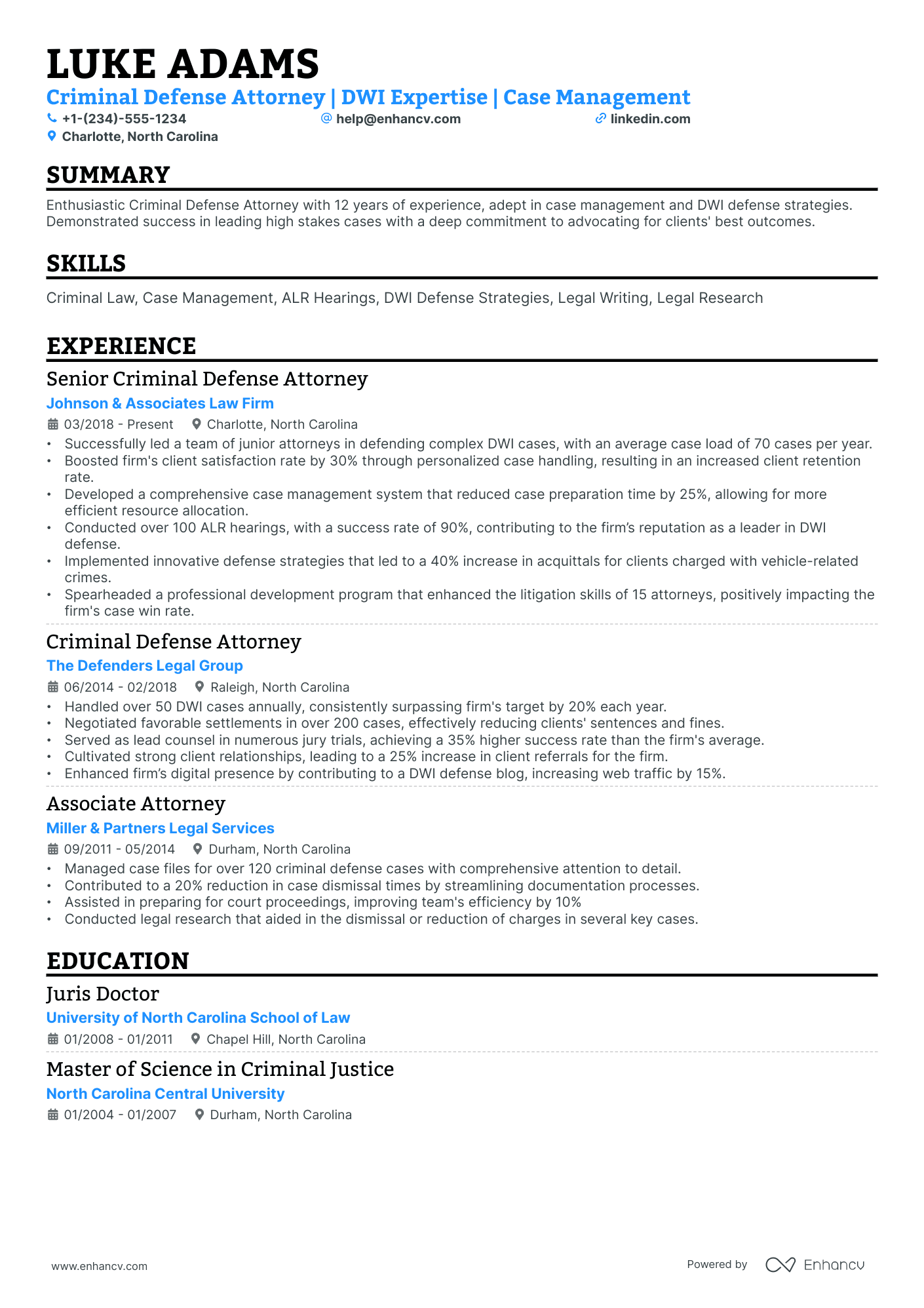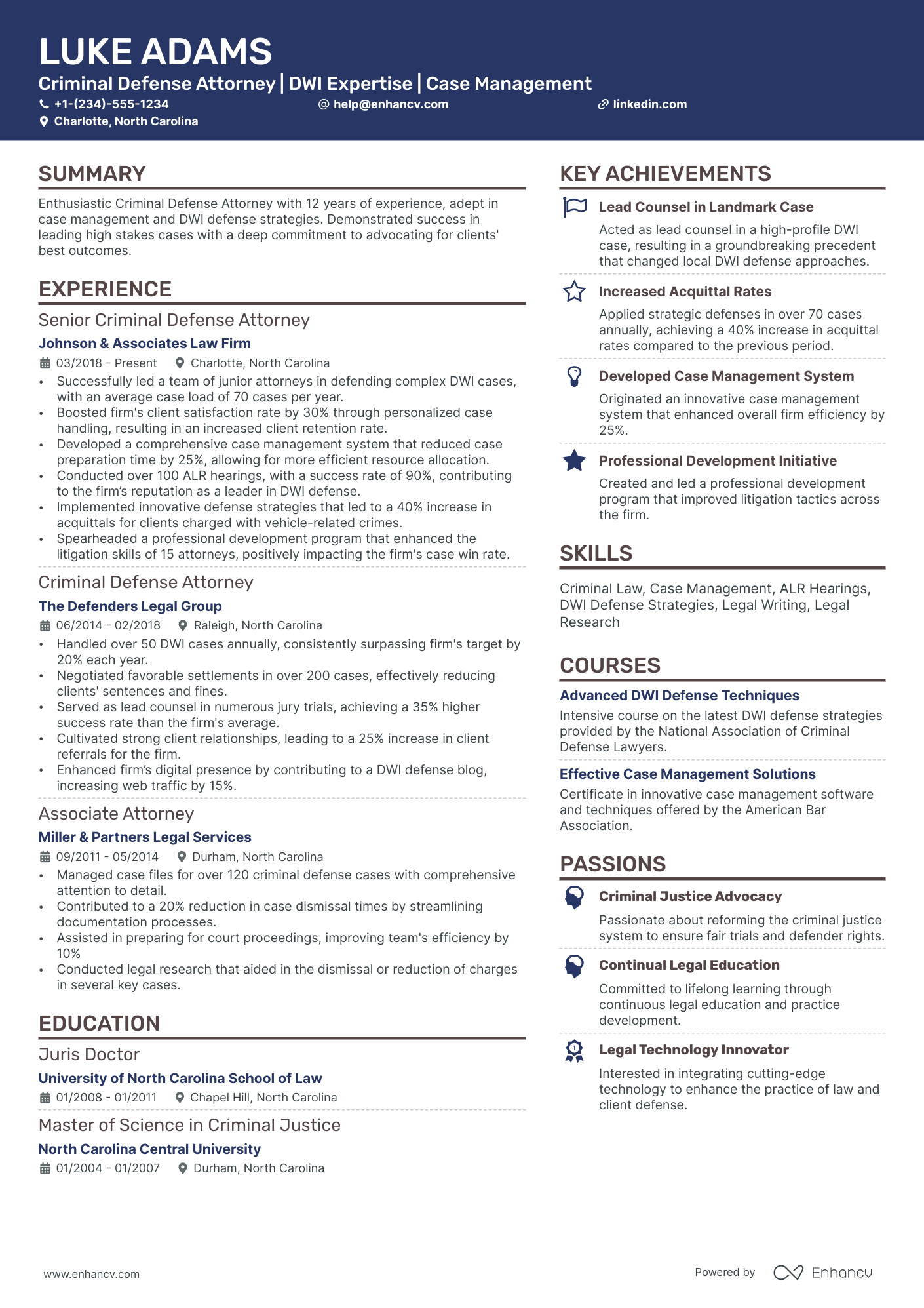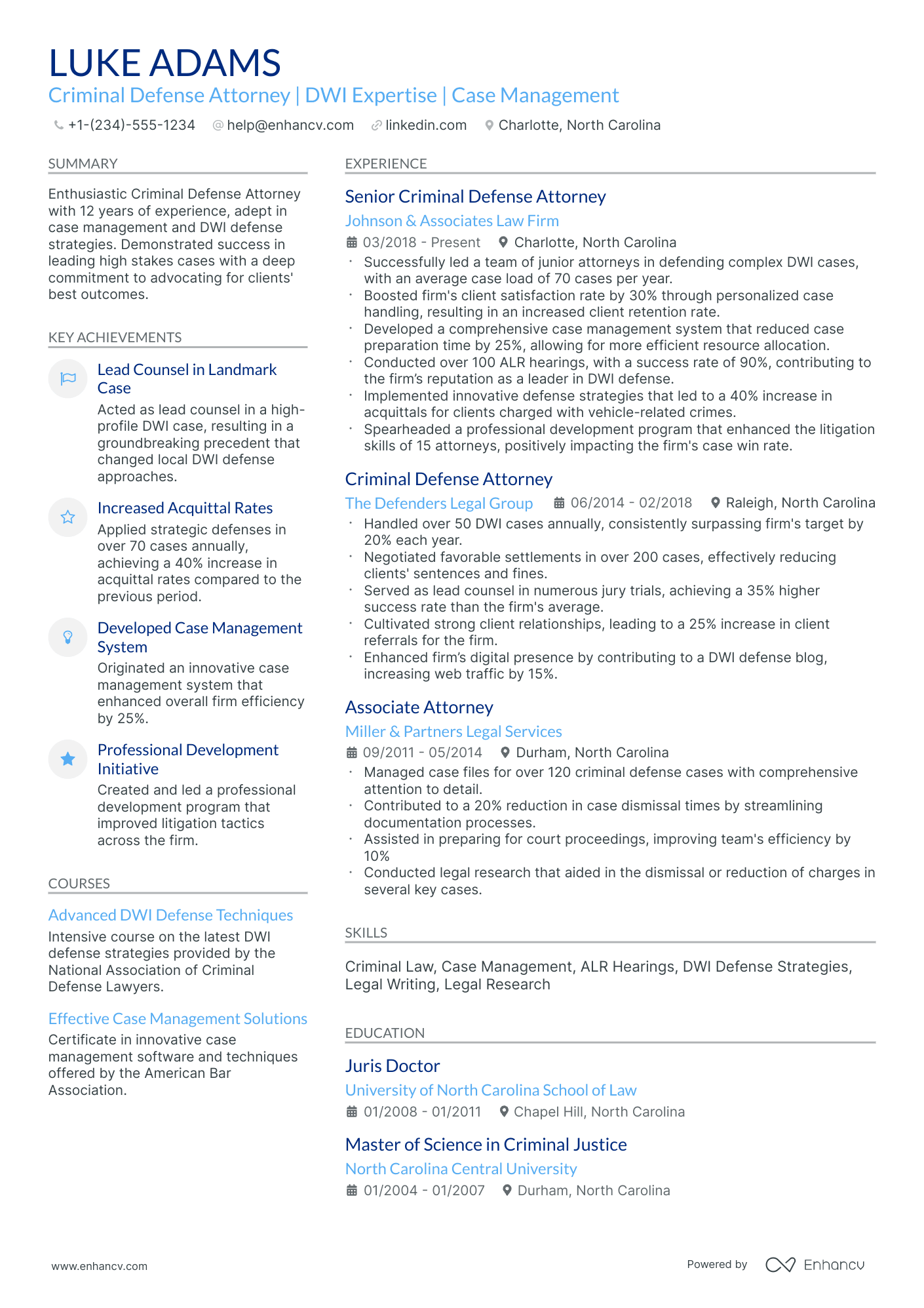You, as a criminal lawyer, may struggle to effectively showcase your diverse courtroom experience and intricate case work on your resume. Our guide will provide you with actionable strategies to concisely convey your legal expertise and successes, ensuring your resume stands out to potential employers.
- Apply best practices from professional resumes to spotlight your application;
- Quantify your professional experience with achievements, career highlights, projects, and more;
- Write an eye-catching criminal lawyer resume top one-third with your header, summary/objective, and skills section;
- Fill in the gaps of your experience with extracurricular, education, and more vital resume sections.
We've selected, especially for you, some of our most relevant criminal lawyer resume guides. Getting you from thinking about your next career move to landing your dream job.
- Immigration Lawyer Resume Example
- Real Estate Lawyer Resume Example
- Trial Lawyer Resume Example
- Employment Lawyer Resume Example
- M&A Lawyer Resume Example
- Personal Injury Lawyer Resume Example
- Patent Lawyer Resume Example
- Litigation Lawyer Resume Example
- Attorney Resume Example
- Counsel Resume Example
Optimize your criminal lawyer resume format to pass the recruiters' assessment
You may be wondering just how much time you need to spend on designing your criminal lawyer resume.
What recruiters are looking for is systematised content that is clear and coherent. Thus, your criminal lawyer resume needs to answer requirements and why you're the best candidate for the role from the get-go.
Often, a clear layout consists of:
- Sorting your experience in the reverse chronological order - starting with your most recent and relevant roles. This is an excellent choice for more experienced professionals;
- Writing your contact information (e.g. personal phone number and email address) and your portfolio or LinkedIn link in your criminal lawyer resume header. If you're wondering to include a photo or not, always make sure that it's appropriate for the country you're applying in;
- Use the basic, most important criminal lawyer resume sections - your experience, education, summary, etc. Use your resume's real estate wisely to tell a compelling, professional story and match job description's keywords;
- Don't go overboard with the length of your resume. One page is absolutely fine if you happen to have under a decade of relevant experience.
Are you still wondering if you should submit your criminal lawyer resume in PDF or Word format ? The PDF has a few more advantages, as it doesn't change the format and the text can't be altered upon application.
Format matters most when your criminal lawyer resume is assessed by the Applicant Tracker System (or the ATS).
The ATS parses resumes, looking for specific keywords, skills or experience that match the job description.
P.S. We recently did a study on how the ATS works and were able to demystify three of the biggest misconceptions about how it assesses candidate resumes.
To pass the ATS evaluation, select any of the serif or sans-serif fonts. Popular choices that would help your criminal lawyer resume stand out include Raleway, Exo 2, Montserrat, etc.
Most traditionalists go for Arial or Times New Roman, but it's often the case that many candidates choose these fonts, and you'd thus lose points on the uniqueness front.
Align your resume with the market’s standards – Canadian resumes may have unique layout guidelines.
Upload & Check Your Resume
Drop your resume here or choose a file. PDF & DOCX only. Max 2MB file size.
PRO TIP
If you happen to have some basic certificates, don't invest too much of your criminal lawyer resume real estate in them. Instead, list them within the skills section or as part of your relevant experience. This way you'd ensure you meet all job requirements while dedicating your certificates to only the most in-demand certification across the industry.
Essential sections that should make up your criminal lawyer resume include:
- The header - with your contact details (e.g. email and telephone number), link to your portfolio, and headline
- The summary (or objective) - to spotlight the peaks of your professional career, so far
- The experience section - with up to six bullets per role to detail specific outcomes
- The skills list - to provide a healthy mix between your personal and professional talents
- The education and certification - showing your most relevant degrees and certificates to the criminal lawyer role
What recruiters want to see on your resume:
- Proven track record of handling complex defense cases and achieving favorable outcomes for clients
- Strong understanding and application of criminal law, including knowledge of current legal precedents and statutes
- Excellent negotiation skills, with a demonstrated ability to plea bargain effectively and persuasively argue cases in court
- Experience with legal research and writing, including drafting of motions, briefs, and other legal documents pertaining to criminal defense
- Substantial knowledge of the criminal justice system and procedures, including jury selection, cross-examination techniques, and case investigation strategies
Guide to your most impressive criminal lawyer resume experience section
When it comes to your resume experience , stick to these simple, yet effective five steps:
- Show how your experience is relevant by including your responsibility, skill used, and outcome/-s;
- Use individual bullets to answer how your experience aligns with the job requirements;
- Think of a way to demonstrate the tangible results of your success with stats, numbers, and/or percentages ;
- Always tailor the experience section to the criminal lawyer role you're applying for - this may sometimes include taking out irrelevant experience items;
- Highlight your best (and most relevant) achievements towards the top of each experience bullet.
You're not alone if you're struggling with curating your experience section. That's why we've prepared some professional, real-life criminal lawyer resume samples to show how to best write your experience section (and more).
- Defended over 100 clients in criminal cases ranging from misdemeanors to serious felonies with a 65% acquittal rate, showcasing strong advocacy and trial management skills.
- Collaborated closely with expert witnesses to strengthen case strategies, which contributed to favorable plea bargains in 40% of cases.
- Conducted thorough legal research to challenge prosecutorial evidence, ultimately leading to the dismissal of charges in approximately 30 cases.
- Successfully litigated over 150 criminal cases, with a significant focus on white-collar crimes, achieving reduced sentences for clients in 80% of the cases.
- Implemented new technology for evidence organization, enhancing the firm's ability to handle complex financial fraud cases effectively.
- Mentored junior attorneys, providing guidance on case preparation and courtroom tactics, which increased the overall efficiency of the legal team by 25%.
- Spearheaded the criminal law department's expansion into cybercrime defense, securing on average 15 new clients per quarter.
- Led a high-profile murder case defense, orchestrating a multifaceted strategy that involved forensic analysis, which contributed to a not guilty verdict.
- Enhanced the firm's reputation by presenting on contemporary criminal defense strategies at national law conferences, resulting in a 20% increase in client referrals.
- Executed a groundbreaking defense in a complex drug trafficking case through the leverage of new forensic accounting techniques, leading to case dismissal.
- Negotiated plea deals for clients involving reduced charges, with over 50 successful negotiations resulting in lower sentences and fines.
- Pioneered the use of virtual reality crime scene reenactment for case preparation, increasing the effectiveness of defense arguments in court trials.
- Directed a team of junior lawyers in managing a caseload of over 200 DUI and drug-related offenses, securing a 70% favorable outcome rate.
- Adeptly managed media relations for high-profile criminal cases, resulting in favorable public opinion and support for clients in 60% of cases.
- Initiated and conducted 'Know Your Rights' workshops in local communities, which led to a stronger rapport with potential clients and a 15% growth in the client base.
- Acted as lead counsel in multiple federal criminal cases, embracing complex litigation that involved RICO, tax evasion, and money laundering charges.
- Modernized case file management with digital tools, decreasing document retrieval times by 40% and boosting overall case handling efficiency.
- Navigated and resolved ethical dilemmas in the course of practice, ensuring adherence to the highest legal standards and maintaining the firm's integrity.
- Functioned as a criminal law consultant for several tech startups, advising on regulatory compliance related to computer fraud and digital privacy laws.
- Delivered keynote speeches at legal symposiums about the evolving landscape of digital crime prosecution and defense tactics.
- Grew a specialized practice area in cybercriminal law, resulting in a 45% client increase and expanded market recognition for the firm.
- Headed a team in negotiating and finalizing non-trial resolutions for 80% of criminal cases assigned, reflecting a strong capacity for persuasive negotiation.
- Championed the development of legal aid initiatives for underrepresented communities, offering pro bono services that aided over 200 individuals.
- Regularly appeared as a legal analyst on national television, contributing to a high-profile presence that attracted top-tier criminal cases to the firm.
The following content includes information from "O*NET OnLine" by the U.S. Department of Labor, Employment and Training Administration (USDOL/ETA). Used under the CC BY 4.0 license. The data represents the top responsibilities present on the task lists for criminal lawyer professionals.
Top Responsibilities for Criminal Lawyer:
- Interpret laws, rulings and regulations for individuals and businesses.
- Analyze the probable outcomes of cases, using knowledge of legal precedents.
- Gather evidence to formulate defense or to initiate legal actions by such means as interviewing clients and witnesses to ascertain the facts of a case.
- Represent clients in court or before government agencies.
- Evaluate findings and develop strategies and arguments in preparation for presentation of cases.
- Advise clients concerning business transactions, claim liability, advisability of prosecuting or defending lawsuits, or legal rights and obligations.
- Examine legal data to determine advisability of defending or prosecuting lawsuit.
- Prepare, draft, and review legal documents, such as wills, deeds, patent applications, mortgages, leases, and contracts.
- Study Constitution, statutes, decisions, regulations, and ordinances of quasi-judicial bodies to determine ramifications for cases.
- Negotiate settlements of civil disputes.
Quantifying impact on your resume
- Include the number of cases won to demonstrate a track record of success and effectiveness in litigation.
- Specify the number of years of experience in criminal law to highlight expertise and industry longevity.
- Mention the quantity of high-profile cases handled to showcase ability to manage complex and sensitive legal issues.
- List the percentage of cases settled out of court to illustrate negotiation skills and efficiency in resolving disputes.
- Indicate the range of cases managed simultaneously to show organizational skills and multitasking abilities.
- Feature the volume of pro bono work completed to reflect a commitment to social justice and legal service.
- Present the number of jury trials conducted to emphasize courtroom proficiency and persuasive abilities.
- Enumerate any publications or research conducted in the field to establish thought leadership and legal acumen.
Action verbs for your criminal lawyer resume
Writing your criminal lawyer experience section without any real-world experience
Professionals, lacking experience, here's how to kick-start your criminal lawyer career:
- Substitute experience with relevant knowledge and skills, vital for the criminal lawyer role
- Highlight any relevant certifications and education - to showcase that you have the relevant technical training for the job
- Definitely include a professional portfolio of your work so far that could include university projects or ones you've done in your free time
- Have a big focus on your transferable skills to answer what further value you'd bring about as a candidate for the criminal lawyer job
- Include an objective to highlight how you see your professional growth, as part of the company
Recommended reads:
PRO TIP
If you failed to obtain one of the certificates, as listed in the requirements, but decide to include it on your resume, make sure to include a note somewhere that you have the "relevant training, but are planning to re-take the exams". Support this statement with the actual date you're planning to be re-examined. Always be honest on your resume.
Creating your criminal lawyer resume skills section: balancing hard skills and soft skills
Recruiters hiring for criminal lawyer roles are always keen on hiring candidates with relevant technical and people talents. Hard skills or technical ones are quite beneficial for the industry - as they refer to your competency with particular software and technologies. Meanwhile, your soft (or people) skills are quite crucial to yours and the company's professional growth as they detail how you'd cooperate and interact in your potential environment. Here's how to describe your hard and soft skill set in your criminal lawyer resume:
- Consider what the key job requirements are and list those towards the top of your skills section.
- Think of individual, specific skills that help you stand out amongst competitors, and detail how they've helped you succeed in the past.
- Look to the future of the industry and list all software/technologies which are forward-facing.
- Create a separate, technical skills section to supplement your experience and further align with the criminal lawyer job advert. Find the perfect balance between your resume hard and soft skills with our two lists.
Top skills for your criminal lawyer resume:
Legal Research Software
Case Management Systems
E-Discovery Tools
Document Management Systems
Trial Presentation Software
Legal Writing Tools
Westlaw
LexisNexis
Court Filing Software
Forensic Analysis Tools
Analytical Thinking
Negotiation
Communication
Problem Solving
Attention to Detail
Empathy
Persuasiveness
Time Management
Critical Thinking
Stress Management
Next, you will find information on the top technologies for criminal lawyer professonals from "O*NET OnLine" by the U.S. Department of Labor, Employment and Training Administration (USDOL/ETA). Used under the CC BY 4.0 license.
Top technologies for Criminal Lawyer’s resume:
- LexisNexis CaseMap
- Microsoft Access
- IDEA TrialPro
- Microsoft PowerPoint
- Adobe Acrobat
- Microsoft Office SharePoint Server MOSS
PRO TIP
List all your relevant higher education degrees within your resume in reverse chronological order (starting with the latest). There are cases when your PhD in a particular field could help you stand apart from other candidates.
Maximizing your criminal lawyer resume: education and certification sections
To effectively showcase your industry knowledge in your criminal lawyer resume, it's important to properly list your education and certifications.
For the education section, ensure you include:
- Higher education degrees pertinent to the industry or those at a postgraduate level;
- The start and end dates of your education, along with the name of the institution you graduated from;
- Your GPA and relevant coursework, but only if they are impressive and applicable to the role.
Additionally, create a separate certifications section to spotlight your most notable recognitions. Another excellent place to feature a leading industry certificate is in your resume header, right after your name.
Below is a list of key industry certifications that are often sought after by recruiters
The top 5 certifications for your criminal lawyer resume:
- Certified Criminal Law Specialist (CCLS) - Various State Bar Associations
- Board Certified in Criminal Law (BCCL) - National Board of Trial Advocacy (NBTA)
- Certified Legal Specialist in Criminal Law (CLSCL) - State Legal Certification Boards
- Fellow of the American Board of criminal lawyers (FABCL) - American Board of criminal lawyers (ABCL)
- Certified Criminal Defense Advocate (CCDA) - National Association of Criminal Defense Lawyers (NACDL)
The content below includes information from "O*NET OnLine" by the U.S. Department of Labor, Employment and Training Administration (USDOL/ETA). Used under the CC BY 4.0 license. The data represents the top associations for criminal lawyer professionals.
Top US associations for a Criminal Lawyer professional
- American Association for Justice
- American Bar Association
- American Health Lawyers Association
- DRI
- Federal Bar Association
PRO TIP
If the certificate you've obtained is especially vital for the industry or company, include it as part of your name within the resume headline.
Recommended reads:
Writing the criminal lawyer resume summary or objective: achievements, keywords, dreams, and more
Deciding on whether to include a resume summary or resume objective should entirely depend on your career situation.
If you have:
- Plenty of relevant achievements you'd like to bring recruiters' focus to, make use of the resume summary. Ensure each of your achievements is quantified with concrete proof (e.g. % of cases solved).
- Less applicable experience, utilize the resume objective. Within the objective include a few noteworthy, past successes, followed up by your professional dreams.
As a bonus, you could define in either your criminal lawyer resume summary or objective what makes you the perfect candidate for the role.
Think about your unique hard and soft skills that would make your expertise even more important to the job.
These criminal lawyer professionals have completely covered the formula for the ideal resume introduction:
Resume summaries for a criminal lawyer job
- Seasoned criminal defense attorney with over 10 years of courtroom experience, boasting a record of 95% case success rate, adept in leveraging forensic science and witness testimony to secure client acquittals. Skilled in navigating complex legal frameworks to strategically defend high-profile cases.
- Former corporate litigator with 7 years of experience at a top-tier law firm transitions to criminal defense. Brings a keen analytical mind, in-depth understanding of business law, and proven track record in successfully litigating and negotiating complex legal disputes.
- Ex-military prosecutor with an extensive 8-year background in military justice and international law, now pursuing criminal defense to utilize robust interrogation techniques and tactical case analysis. Demonstrated excellence in achieving justice in over 150 court-martial cases.
- Detail-oriented forensic accountant with 6 years of experience in financial fraud investigations joins the criminal law arena, equipped with expertise in unraveling intricate money trails and presenting findings that enhance case strategies for defense.
- Aspiring to embark on a criminal law career, a recent top-tier law school graduate driven to combine the theoretical knowledge of criminal justice with practical application. Eager to devote tenacious research skills and fresh insights to support legal teams in championing clients' rights.
- Dynamic and ambitious, a new Juris Doctor seeking an entry-level position in criminal defense to contribute strong interpersonal skills and a fervent commitment to upholding the law. Aim to leverage academic honors and moot court accomplishments in supporting case preparations and client advocacy.
Optimize your resume summary and objective for ATS
Drop your resume here or choose a file.
PDF & DOCX only. Max 2MB file size.
Average salary info by state in the US for criminal lawyer professionals
Local salary info for Criminal Lawyer.” Source: My Next Move, National Center for O*NET Development. Accessed 10/15/2024
| State | Average Salary (in USD) |
|---|---|
| US National Average | $145,760 |
| California (CA) | $185,050 |
| Texas (TX) | $145,000 |
| Florida (FL) | $121,500 |
| New York (NY) | $179,650 |
| Pennsylvania (PA) | $130,270 |
| Illinois (IL) | $161,880 |
| Ohio (OH) | $117,500 |
| Georgia (GA) | $131,090 |
| North Carolina (NC) | $133,130 |
| Michigan (MI) | $121,760 |
Extra criminal lawyer resume sections and elements
Creating a winning criminal lawyer resume isn't about following a rigid formula. The key is to tailor it to the job requirements while maintaining your unique personality.
Consider including these additional resume sections to enhance your profile:
- Awards - Highlight industry-specific awards as well as any personal accolades to demonstrate recognition of your expertise and achievements;
- Hobbies and interests - Share your interests outside of work. This can provide insights into your personality and indicate whether you'd be a good cultural fit for the organization;
- Projects - Detail significant projects you've been involved in, focusing on your contributions and the outcomes;
- Publications - If you've authored or co-authored academic papers or other publications, include them to establish your credibility and in-depth knowledge of the field.
These sections can give a more comprehensive view of your capabilities and character, complementing the standard resume content.
Key takeaways
We trust that this Enhancv guide has been informative and useful. To summarize the essential points:
- Opt for a simple and readable format, focusing more on your criminal lawyer achievements rather than just duties;
- Emphasize your accomplishments in the criminal lawyer experience section over mere responsibilities;
- If lacking relevant experience, utilize various resume sections like education and volunteering to demonstrate your suitable skill set;
- Never overlook the significance of pertinent higher education, training, and certifications;
- Incorporate diverse sections in your resume to highlight not just your skills expertise but also your personality.
